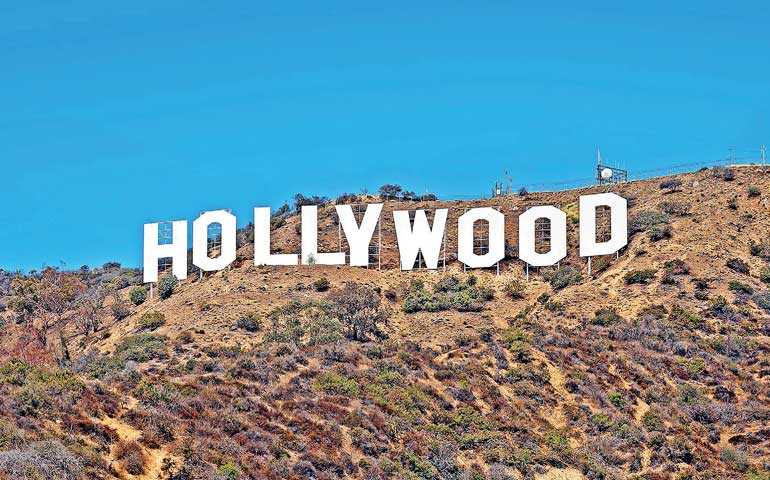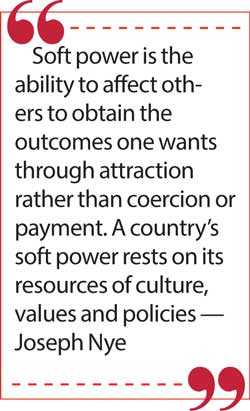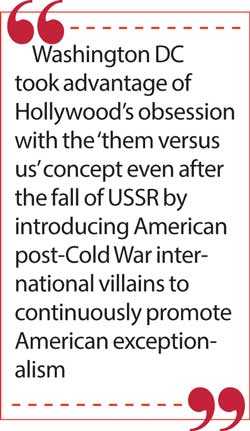Friday Feb 20, 2026
Friday Feb 20, 2026
Tuesday, 29 December 2020 00:43 - - {{hitsCtrl.values.hits}}

A view shows the iconic ‘Hollywood’ sign overlooking Southern California’s film-and-television hub in the Hollywood Hills in Los Angeles, California, US, 1 January 2017 — Reuters
By Trivan Annakkarage
Motion pictures are a magical feat that explains a story which captures our hearts and minds and remains deep within our subconscious. Hence movies are a very powerful form of entertainment and its ability to attract masses were envisioned even by those early inventors of film-making, such as Eadweard Muybridge of Britain, the American inventor Thomas Edison, followed by the French Lumiere Brothers, to name a few.
Film studios were immediately established in major cities around the world, such as in New York, Los Angeles, Shanghai, Tokyo, Berlin, London, Paris, Mumbai, Rio de Janeiro, Rome, Toronto, Moscow and Sydney in the late 19th and early 20th centuries to cater to this rising demand for a novel form of entertainment.
However, the American film industry, Hollywood (named after a municipality located within the city of Los Angeles), was soon to overtake international competition by becoming a colossal industry and gaining the attention of American policymakers in Washington DC, who identified its potential (Guzelipek, 2018).
Soft power
‘Soft power’ in foreign policy is a term introduced by the American scholar Joseph Nye, a proponent of Neoliberalism. In his article ‘Public Diplomacy and soft power’, published in 2008, Nye describes the concept of soft power as follows: “Soft power is the ability to affect others to obtain the outcomes one wants through attraction rather than coercion or payment. A country’s soft power rests on its resources of culture, values and policies.”
Moreover, in his book published in 2002, titled ‘The Paradox of American Power’, Nye explains that projection of soft power by a powerful nation-state (i.e., USA, China or Japan, etc.) creates a sense of admiration and obedience towards that country by other less powerful or developing countries in the international system. Such soft power tools include the establishment of low cost but high-quality educational institutions which promote the values of the donor nation-state and through providing scholarship programs, the founding of welfare organisations in countries where the majority of its people are below the poverty line, donations towards medium-scale infrastructure projects, such as schools, universities, conference halls, theatres, sporting venues, etc., and entertainment (i.e., movies, TV series and commercials) to name a few. From the aforementioned list, the latter is what successfully captures the desired respect powerful nation-states vie from less powerful countries.
Therefore, the entertainment industry is used as a foreign policy tool by powerful nation-states today, such as the USA, China, Japan, the UK, India, Brazil, South Korea, and Turkey, to name a few. However, the American government exploits its entertainment industry to maintain its global hegemony in ways unparalleled to any other nation-state.
Ian Buruma correctly states this in his article titled; The Road to Babel (2001) that in today’s world Hollywood has become the common reference for entertainment to those people interacting from different cultural backgrounds.
According to Rugh (2009), Hollywood movies reach every corner of the world and mesmerise people due to the quality and superior technology applied to its visuals. Therefore it is no secret that Hollywood directors and producers cooperate professionally with the White House, United States Department of State, Central Intelligence Agency (CIA), and the Pentagon, followed by other relevant public institutions to shape the idea of ‘America’ in the hearts and minds of its local and international viewers. 
Therefore, entertainment from Hollywood tends to have a subtle political backdrop beside the artistic content (Guzlipek, 2018). This political manoeuvring involves the installation of American exceptionalism in the subconscious of the viewer. Koh (2003), in his study on American exceptionalism, cited the historian Margaret Macmillan on her analysis of this term. She states that: “Faith in their own exceptionalism has sometimes led to a certain obtuseness on the part of Americans, a tendency to preach to the other nations rather than listen to them, a tendency as well to assume that American motives are pure where those of others are not.”
Such examples of American exceptionalism were portrayed by the film Argo (2012), which won the Academy Award for Best Picture in 2013. The story revolves around the CIA covert operation to rescue six US diplomats from Tehran, Iran, under the guise of filming a science-fiction film during the 1979-1981 Iranian hostage crisis.
The nominees and announcement for Best Picture were read out by First Lady Michelle Obama live from the Diplomatic Room of the White House. This is evidence of the fact of how important Hollywood films are in portraying the image of the USA to Americans and the world at large.
Moreover, Hollywood movies tend to portray the United States as the country where everyone is treated equally: women being empowered; liberal values upheld; people being valued for who they are and not for what they are; no obstacles for becoming successful; and valuing secularism followed by brave, kind-hearted, sensible men and women residing in this land of the free.
These messages run deep into the subconscious of the viewers thus associating the USA with all the above virtues (Halbert, 2004). This has influenced people around the world to react against their totalitarian regimes, such as those existent in China, Iran and Russia. Therefore this has led to such governments censoring or limiting the flood of Hollywood movies into their countries.
Propaganda
The Cold War era in particular saw the influence of Washington DC in Hollywood movies. This was the time when the idea of ‘them versus us’ became synonymous with films produced in America. ‘Us’ represented the heroic virtues of the USA (as stated above) and its allies, while ‘they’ represented all the other nation-states that were aligned with the Soviets. Moreover, despite being international in its outlook, Hollywood rarely considers the representation of nation-states in the non-aligned movement in their movies. Nevertheless, those ‘them versus us’ movies were targeted largely at the audience in countries that had not selected a side during the Cold War era.
A prime example of Cold War era subtle Hollywood propaganda, according to Guzelipek (2018), is the original Star Wars trilogy (1977, 1980 and 1983). The series can be identified as a result of the space race that existed during that era.
This is because the movie projects the possibility of American extraterrestrial hegemony (Guzelipek, 2018). Furthermore, through the Star Wars series, this scholar has identified two other key messages which Washington wishes to propagate about the USA. The first is the dark side and light side of ‘The Force’. Here, the dark side represents Soviet-style despotism/authoritarianism, rigid hierarchical relationships, lack of humour, and brutal acts committed among its own people (the villains) while the light side represents the free-spirited, friendly, sincere and approachable United States (the heroes).
The second is the idea of the ‘chosen one’. This idea perfectly resonates with American exceptionalism, the idea Washington DC wishes to propagate. According to Judis (2005), American presidents describe the United States as the nation ‘being called’, ‘given the mission’, ‘maker of heaven’, ‘authority of liberty’, and so on.
To back this claim, Kissinger (2004), too, states that the American Presidency is the ‘searchlight’ for humanity. Hollywood’s influence on its viewers was so strong that in 1981, a former Hollywood actor, Ronald Regan, was elected to the White House as the 40th president of the USA. Under his presidency, American exceptionalism, the light side of the force, and the chosen one were in full swing, and so, American foreign policy was overtly communicated through Hollywood movies. Currently, it is speculated that the Walt Disney Company current Executive Chairman Robert Iger would become a future US President due to Disney’s influence on both American and international media.
Nevertheless, Washington DC took advantage of Hollywood’s obsession with the ‘them versus us’ concept even after the fall of USSR by introducing American post-Cold War international villains to continuously promote American exceptionalism.
These villains included the governments of North Korea, Iraq, Iran, Africa and East Europe followed by non-state actors, such as Islamic terrorists and Latin American drug cartels. Aydemir (2017), in his study, states that Hollywood movies, such as The Patriot (2000), Saving Private Ryan (1998), Operation Rogue (2014), True Lies (1994), Body of Lies (2008), Green Zone (2010), and Tears of the Sun (2003), make the viewer believe that the USA is the only country that can save the world from tyranny, who can defeat the bad no matter how strong the bad guys are, the only nation that can counter Islamic terrorism, a force that breaks the chains of authoritarian rule, and a safe haven for political and other refugees.
Diversity
However, there are visible changes in the recent genre of Hollywood movies. This is due to the influx of directors and producers of international backgrounds penetrating the American film industry. They include directors and produces from African (Spike Lee, Tyler Perry, Mattew Cherry), Far East Asian (Ang Lee, Justin Lin, Alice Wu), South Asian (Tarem Singh, Deepa Mehta, Mira Nair), and Latin American (Alfonso Cuaron, Fernando Meirelles, Guillermo del Toro) descent.
Therefore films directed and produced by them give a holistic picture of the true nature of American society, its government and its foreign policies. They include movies such as Monsoon Wedding (2001), City of Gold (2002), Brokeback Mountain (2005), Water (2005), The Fall (2007), The Help (2011), 12 Years a Slave (2013), Hidden Figures (2016), The Shape of Water (2018), Black Panther (2018), and Us (2019).
The unexpected occurred in 2016 when the Chinese company Wanda Group acquired the American media giant Legendary Pictures Productions LLC. The Communist Party of China has long envied and admired how Hollywood propagates American exceptionalism, and this move was a carefully crafted strategy.
This move has benefitted China in two ways. The first is to have its share of Hollywood movie sales in China, and the second to polish China’s image in the world’s eye through Hollywood movies. China, once considered a villain in Hollywood movies, are now portrayed as wise, endowed with ancient knowledge, spontaneous, honest and equal partners for their starring American actors.
Furthermore, the rise of female produces, too, has emphasised on feminist culture in Hollywood, thus embracing, appreciating and amalgamating cultures outside the United States. Wonder Woman (2017) Director Patty Jenkins can be considered a perfect example of a feminist director. These female and other international directors in Hollywood have removed the American nationalist elements from their movies to show the naked truth of what the USA is all about, and that is to say that American exceptionalism was all about white superiority in America and around the world.
In conclusion, entertainment is experiencing a new golden age through smart television and laptop screens due to people being restricted from travelling by their respective governments around the world as a measure to prevent the spread of COVID-19. Therefore, American entertainment providers, such as Netflix, Amazon Prime Video, HULU, and HBO Now, are now the latest mediums in which Washington wishes to exert its soft power.
However, emerging powers, such as China, India, Brazil and Russia, are challenging the present unipolar American status quo and penetrating international audiences beyond their region with equally high-quality cinematic experiences and genres to rival those of Hollywood. This is exemplified by the South Korean movie Parasite being the first-ever non-English language film to be awarded ‘Best Picture’ at the Academy Awards in 2019.
These are events which are gradually challenging American exceptionalism on the big screen. Furthermore, there is a tendency of many high-ranking government officials of the United States being represented by non-white individuals due to the recent victory of President-elect Joe Biden. This may influence an altering of the image and values of white-dominated American society in Hollywood movies due to aforementioned directors of African, South Asian, Far East Asian and Latin American descent gaining more prominence.
Hence, the importance of the traditional white-dominated relationship between Hollywood and the White House will of course experience a bumpy road as the Biden era unfolds. Nevertheless, due to governments of aforementioned emerging powers, too, working closely with their respective entertainment industries to enhance their national image in the eyes of international audiences, it would be correct to state that Hollywood’s relationship with the White House will not fade but grow stronger with time, and so, Hollywood will continue to be synonymous with American exceptionalism.
(The writer is an Independent Researcher in International Relations and Postgraduate from University of Colombo and can be reached via [email protected])